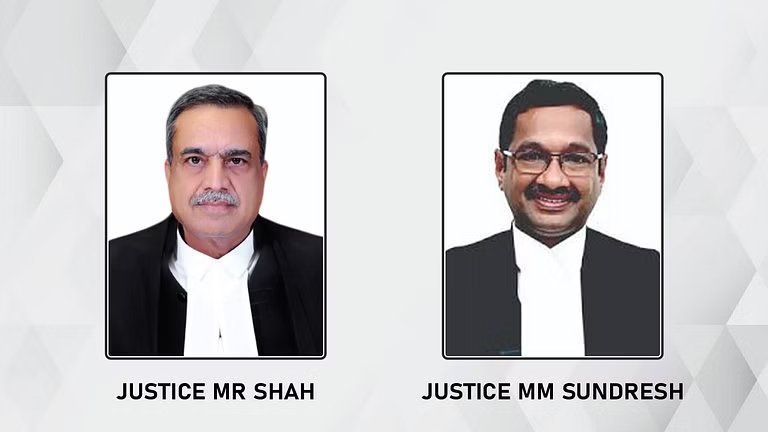Published on :
New Delhi: The Supreme Court on Friday paved the way for lawyers and other professionals with ten years of experience in relevant fields to be members of state and district consumer forums [Secretary Ministry of Consumer Affairs v. Dr Mahindra Bhaskar Limaye and ors].
A bench of Justices MR Shah and MM Sundresh, using its plenary powers under Article 142, also deemed that selection for consumer fora will be through two written papers till a law is enacted.
“Till the suitable amendments are made…in exercise of powers under Article 142 of the Constitution of India and to do complete justice, we direct that in future and hereinafter, a person having bachelor’s degree from a recognized University and who is a person of ability, integrity and standing, and having special knowledge and professional experience of not less than 10 years in consumer affairs, law, public affairs, administration, economics, commerce, industry, finance, management, engineering, technology, public health or medicine, shall be treated as qualified for appointment of President and Members of the State Commission,” the order stated.
Similarly, the Rule requiring 15 years’ experience for appointment to district consumer forums was also struck down.
In doing so, the apex court upheld an order of the Nagpur Bench of the Bombay High Court, which had set aside provisions of the Consumer Protection Rules, 2020 that govern appointment of President and members to State and District Consumer Disputes Redressal Commissions.
The following Rules had been the cause of grievance:
- Rule 3(2) – prescribed a minimum experience of not less than 20 years for appointment of president and members of State Commission;
- Rule 4(2)(c) – prescribed experience of not less than 15 years for appointment of president and members of District Commission; and
- Rule 6(9) provided for the selection committee to determine its procedure for making its recommendations keeping in view the requirement of the Commission.
The High Court had held that these were in violation of the Article 14 of the Constitution, and quashed them along with the ongoing selection process at the time.
It had relied on the Supreme Court’s decisions in State of Uttar Pradesh and others v. All UP Consumer Protection Bar Association and Madras Bar Association v. Union of India, which had stated that a judicial office is essentially one of public trust and persons of high integrity and expertise are expected to hold the position of judge.
The High Court further held that the Rules under challenge were “circumventing” these rulings of the Supreme Court.
This judgment prompted the Union Ministry of Consumer Affairs to file the present appeal before the Supreme Court.
The top court at the outset said that the High Court was right in striking down the rules.
“As per Article 233 of the Constitution, a lawyer needs to have only 7 years of practice as an advocate in High Court. Under the circumstances to provide 20 years’ experience under Rule 3(2)(b) is rightly held to be unconstitutional, arbitrary and violative of the Article 14 of the Constitution of India. We are in complete agreement with the view taken by the High Court.”
It further noted,
“It cannot be disputed that the Commissions are empowered with the powers of court and are quasi judicial authorities and empowered to discharge judicial powers with the adequate powers of the court including civil and criminal. Therefore, the standards expected from the members of the tribunal should be as nearly as possible as applicable to the appointment of judges exercising such powers.”
For the written examinations on the basis of which appointments are made to consumer fora, the Court directed that there will be two papers.
The first paper would be a two-hour objective-type assessment on general knowledge and consumer law.
The second would be a three-hour one, involving writing an essay on public affairs or trade and consumer commerce, as well as a case study to test analytical and drafting abilities.
“The qualifying marks in each paper shall be 50 per cent and there shall be viva voce of 50 marks. Therefore, marks to be allotted out of 250, which shall consist of a written test consisting two papers, each of 100 marks and the 50 marks on the basis of viva voce,” the Bench stated.
Advocates Uday Prakash Warnjikar and Tushar Mandalekar appeared for the respondents.
Attorney General for India R Venkataramani appeared for the Central government.



